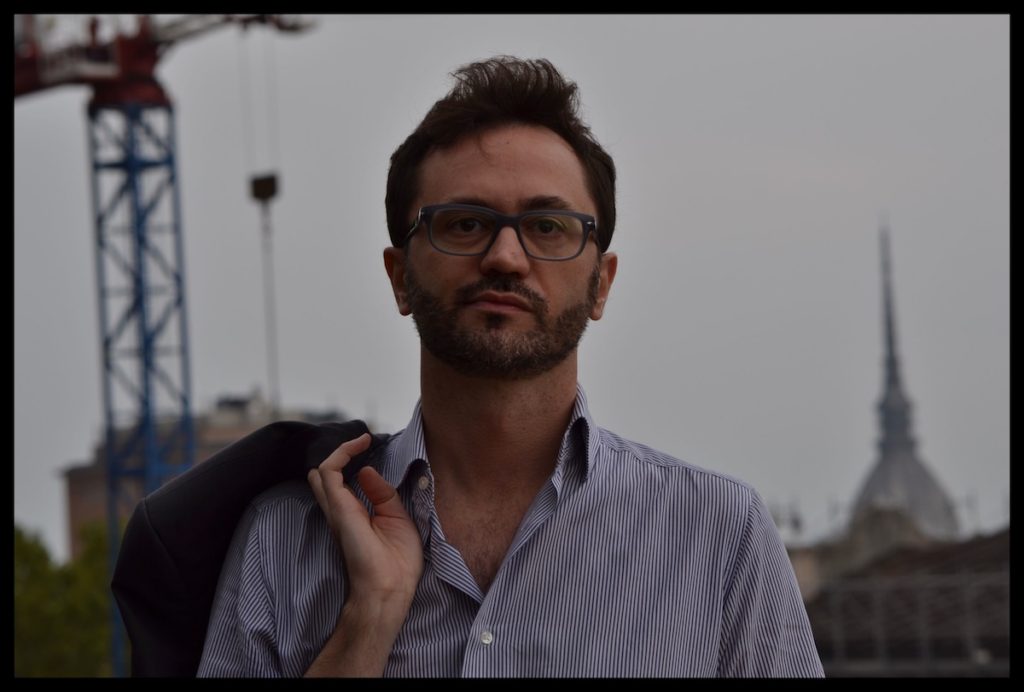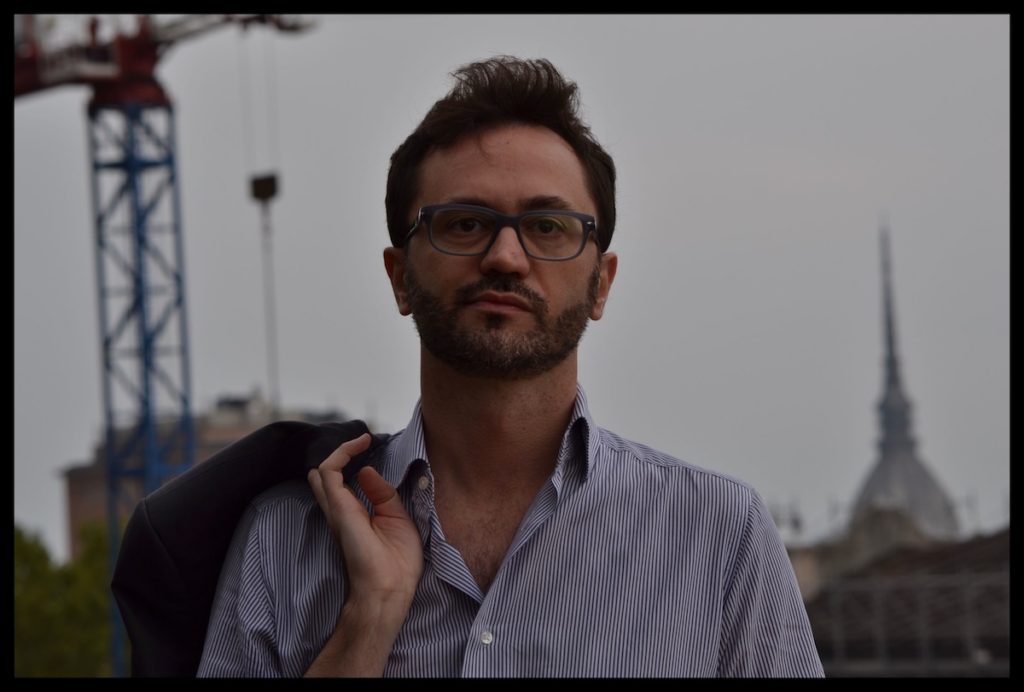Your life until now, in a few lines
I was born in Turin, 40 years ago at Mirafiori, the district of FIAT, to understand each other. Exactly now when I’m answering to these questions, it comes back in my mind that I stepped in there only one month ago, in a piece of the former abandoned factory that now is reborn. There, now, exhibits and fairs take place. I graduated in Communication, dreaming to become a journalist. After few years of apprenticeship, I learned that nothing can be invented en plus by writing for a paper so I quit and made due on the dream of publishing. I moved in Milan, where I fulfilled in full my thirst of invented things by working for romance and visual arts publishers. Then I exaggerated with fantasy and so I needed to get back in the moderate reality of Turin.
Via Artom is your first novel and gained the award Rai La Giara, a very important recognition: it recalls the story of Emanuele Artom to Italians, he was a Jewish partisan – a street in the outskirts of Turin is named after him. How much did you plan to bring back to the collective memory the Emanuele Artom’s story?
Very much. Emanuele has been forgotten from Turin citizens in the years, maybe because he was a deep Turinese, I mean very plain, far from rhetoric, far from emphasis. Little ‘showy’. A discrete person having a braveness and an intelligence both far from the ordinary. I tried to tell him back rather than to remember him. Using a language that is not the one usually adopted for ‘historically relevant’ characters. By inventing and also by reshaping some spaces of his life that have not been documented. And then I tried to let him live side by side – in a certain sense – with the youngsters of our century, in the same city, in the same house.
In your book there is a not masked contrast between the ideals and the personality of Emanuele Artom, as the one you detected from the diaries and for the witnesses of his times, and the contemporary Turinese youth that seems oscillate among narcissism, engagement and superficiality as you write about.
I do not know how to define the Turinese youth, and Via Artom has not any sociological or anthropological ambition. It is only a limited, partial portrait. In the novel, I try to imagine the lives of some teenagers struggling a lot in become adults in a XXI century European city. All in all, they show clumsy, often over the top, and somehow also pathetic. Some of them have great troubles to distinguish the engagement from the ‘theatre of the engagement’, so to say. Some others do not understand which person to trust to. Some others still do not know what they really are and they sink their teeth into right, left and centre. The parallel with Artom’s generous heroism is demeaning for them, of course. But it is the same for everyone. For everyone having a comfortable life with limited horizons and suddenly discover what really did those people on 1943-45 for their fellows, for their Nation.
Some characters of Via Artom are coming from Maghreb and cross their lives of those born in Turin as being litmus tests, to highlight the shadows. And themselves are mostly in twilight areas. How do you live the strong presence of extra-UE resident in the city, in the neat Savoy ‘quadrilaterals’?
I live it with happiness and then with a strong spirit of compensation and triumph toward who does not want them here. To see my city always more crowded of different ethnic groups is a letdown for those hating the idea of an open, dense and stratified, welcoming society. And I’m happy to see, everyday, how their project is defeated, if we can put it in that way. Anyway, Turin is an unique city also on this side. It knows how to welcome, it knows how to work with patience to host who arrives from far away. The city texture is full of charities and institutes working for that. The proverbial coldness and indifference of the Turinese is not true, it is the outcome of a misunderstanding: in truth, it is respect. Turin is a respectful city. Without clamour, with great elegance, ‘it mocks to do not see’ in the best meaning of these words: in so, it allows a serene coexistence. The Turinese do not criticize, they observe (a lot, they are very keen) but they do not let their glance weigh, so to speak. To speak of twilight areas, indeed, it must be said that Tarik, the character of the novel is very young and arrives very entitled in Turin. He is quick, intuitive and knows how to speak to the heart of people. But he bumps immediately into with a terrible state-of-fact: he cannot live as his Italian peers because he has to conquer what they have as a right of birth. For who has to rebuild an existence far from home, I imagine it is of the hardest obstacles to be overtaken.
In the end, from 100 to 1, how much do you feel yourself a Turinese?
58. A little more of 50 but less than 60. My parents are from Lucania (a ‘region in a region’ between Tyrrhenian sea and Taranto Gulf, Southern Italy, dating back to the Greek domination and their land partitions) so I have a natural check from the torinesità (being made in Turin). Being Turinese is very easy and sweet in Turin but elsewhere it can be invalidating. As in Naples or in Rome, it can’t be. You risk to be continually teased. When I go there, I have to forget formalism, some modesty and (fantastic, I should say) rituals of educations that in Turin are very necessary and elsewhere can arise lots of fun and derision.
The places in Turin you love and the ones you really do not go through?
I do not love the places of the city getting old badly, without urban planning and full of abandoned and clumped buildings; then the enormous squares sacrificed to cars (as Piazza Statuto), then the gardens and parks ruled by armies of pushers. I love very much the wild and gigantic Pellerina Park, the Po banks, the canoe clubs and the bars on the river alongside Valentino Park; and then the serenity of some, a bit gloomy and not noisy, old districts as Campidoglio and Borgo San Secondo.
What do you drink when you go out, is there a typical drink or some ritual at which you happily submit yourself? Once, late at night, we’re used to go to sip the mysterious cocktail called Tamango in a small, dark club I’m not sure still exist (passing by on day times I am not able to detect it, I see only walls…). It is a mystic reddish cherries flavoured mash with a monstrous power and hallucinogenic effects. Then I got old and I got stuck on the old and dear beer. Double malt if I want to go too far.
In which way do you like to live slow, is there any special moment in which you indulge in watching the time passing?
The slowness has been never part of my personality and for that I seek it non-stop, I see it as an achievement, sometimes as a mirage. At lunch time, when I stop working for an hour, I dazedly walk through Corso Vittorio Emanuele as a brachycardiac. Sometimes I realize staring at passers as I see humans for the first time. In those minutes, perhaps, I really slow down.
The books you’re reading now
And Never Said a Word, by Heinrich Boll.
The music you more often listen
Gigantic archives of mp3 the computer plays randomly, or radio stations tuned by chance: I am an absent-minded listener. And, above all, maybe I like to get surprised by haphazardness.
Alessandro Musto’s story has been selected by Emina Cevro Vukovic, writer who also interviewed him (translation by Slow Words)

